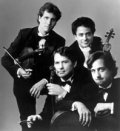
Joseph Haydn
Joseph Haydn was an inventor. He was the father of many of the classical forms as they have survived to modern times; the symphony, the concerto and the string quartet were all Haydn's innovation.
More than that, these forms that he produced laid down the framework for these styles for composers for the next 200 years. Beethoven, Haydn's most famous pupil, was especially influenced by his mentor, and his “Haydnesque” influence is obvious in his early works, but also evident in his later works.
So, you know you should listen to more Haydn. But how to start? Haydn wrote 104 symphonies and 62 piano sonatas and 83 string quartets. His total output is over 340 hours, greater than that of Bach, Mozart or Beethoven.
Where to start?

Emerson Quartet
Enter the Emerson Quartet and their Haydn Project, a set of seven Haydn string quartets in celebration of the Emerson's 25th anniversary.
The seven chosen quartets are certainly the better-known of Haydn's quartets. They span his entire creative career, both in time and style. They encapsulate Haydn's musical character - his brilliant inventiveness, his sparkling humour, his surprises and little quirks that make every work of Haydn's unique.
We start with Op. 20, No. 5, written in a minor key at a time when composers rarely chose a minor key for an entire work. It is serious, even dark, without being sad. Complex yet achingly beautiful.
Next, the Op. 33, No. 2, nicknamed “The Joke”. While the entire work is light and good-natured, the joke comes at the end, when Haydn tricks the audience into thinking the work has finished with ever-longer pauses including a four-bar silence. Then all of a sudden, the complete theme is blurted out anew, but left hanging unresolved.
Op. 54, No. 1 is an exercise in virtuoso brilliance for the first violinist. Unfortunately the lack of a nickname limits its fame.
The next quartet, known as the “Lark”, starts with a fairly square baseline upon which soars a melody that gives it its name. It is equally famous for its
moto perpetuo finale.
The Op.74, No. 3, known as the “Rider” or “Horseman” for its cantering rhythms in the opening movement and a galloping rhythms in the finale. In the middle is a lovely song-like
Largo.
The next, Op.76, No. 2 starts with a highly unusual melody of sometimes rising, sometimes falling fifths, which gives it its nickname, the “Fifths”. It is perhaps even more famous for its third movement,
Allegro ma non troppo, known as the “Witches Minuet” because of its eerie, other-worldly canon.
The final Haydn quartet presented is the Op.77, No.1, written at the end of his career. He was exhaused from writing his
Creation oratorio, and reluctantly agreed to a commission of a further 6 string quartets. He completed just two. Depite this, it bursts with vigor, exuberance and delight, and typical Haydn wit. It is amongst his sunniest of works.
As a bonus, the Emerson have included an extra CD of single string quartet movements, ranging from Mozart, Beethoven, Scubert, Dvorak, their very famous Bartok set, Shostakovich, Ives and Webern. They are oft-performed encore pieces and as a sampler set, are a showcase of the Emerson's wide ranging talent.
And talented they are. These are the first Haydn recordings by the Emerson Quartet, a tribute to the founder of the genre, and played with polish and respect. They are played in modern style, with some longer repeats omitted.
And spectacularly recorded; with good listening equipment, each player's position is heard with pinpoint accuracy, with a closeness and familiarity that is required of a really good chamber performance. Full marks to the recording engineers at DG.
For those familiar with Haydn's quartets, this set will come as refreshingly new. For those getting to know the masterpieces of Haydn, this is an excellent selection that leaves you wanting much more. A triumph!
Please support Good-Music-Guide.com
by purchasing this CD using this link.

Track Listing
The Haydn Project
Seven Haydn String Quartets
and bonus CD with selected works
Emerson String Quartet
CD 1
String Quartet in F minor, op. 20 no. 5
- I. Allegro moderato
- Menuetto
- Adagio
- Finale: Fuga a due soggetti
String Quartet in E flar major, op. 33 no. 2
- Allegro moderato, cantabile
- Scherzo: Allegro
- Largo sostenuto
- Finale: Presto
String Quartet in G major, op. 54 no. 1
- Allegro con brio
- Allegretto
- Menuetto: Allegretto
- Finale: Presto
String Quartet in D major, op. 64 no. 5
- Allegro moderato
- Adagio cantabile
- Menuetto: Allegretto
- Finale: Vivace
CD 2
String Quartet in G minor, op. 74 no. 3
- Allegro
- Largo assai
- Menuet: Allegretto
- Finale: Allegro con brio
String Quartet in D minor, op. 76 no. 2
- Allegro
- Andante o piu tosto allegretto
- Menuetto: Allegro ma non troppo
- Finale: Vivace assai
String Quartet in G major, op. 77 no. 1
- Allegro moderato
- Adagio
- Menuetto: Presto
- Finale: Presto
Bonus CD
- String Quartet No. 14 in G major ("Spring"), K. 387
Molto Allegro
Wolfgang Amadeus Mozart
- Movements (2) for string quartet Allegretto (Polka) for String Quartet
Dmitry Shostakovich
- String Quartet No. 12 in F major ("American"), B. 179 (Op. 96)
Lento
Antonin Dvorak
- String Quartet No. 2, for string quartet, S. 58 (K. 2A3)
Arguments
Charles Ives
- Movements (5) for string quartet, Op. 5
Sehr langsam
Anton Webern
- String Quartet No. 13 in A minor ("Rosamunde"), D. 804 (Op. 29)
Andante
Franz Schubert
- String Quartet, No. 4 in C Major, Sz. 91, BB 93
Allegretto pizzicato
Bela Bartok
- String Quartet No. 9 in C major ("Rasumovsky 3") Op. 59/3
Allegro molto
Ludwig van Beethoven